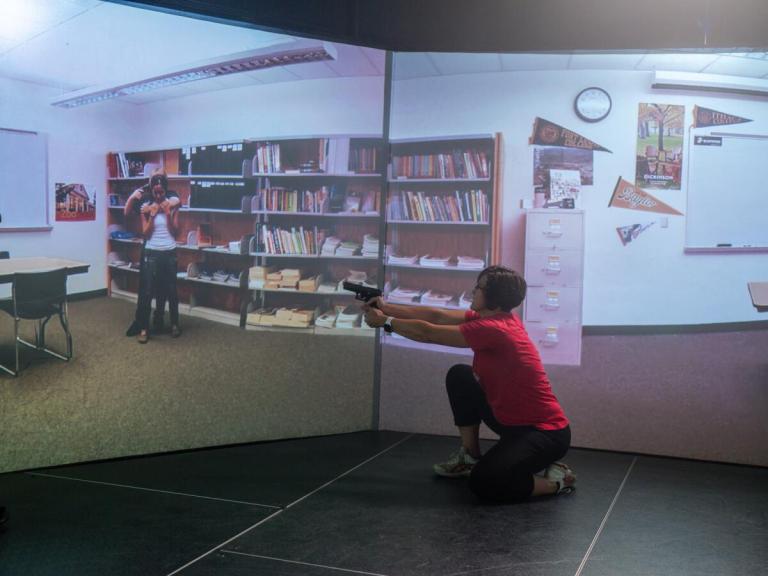
6 Untraditional Habits That Are Scientifically Proven To Make You Happier
By doing things in our daily life that help us to attune to the positive and that boost our mood, we can actually change the neural pathways in our brain.

People who want to feel physically fit often put focus and energy into the pursuit of training their bodies. They may go to a gym and run on a treadmill, lift weights, or begin to take walks. Just like our bodies, through simple daily practices our brains can be “trained” to experience things in a more positive and adaptive way. The main premise behind cognitive behavioral therapy-one of the most effective forms of therapy-is that it is not external events that shape our happiness-rather what actually impacts our happiness is how we think about those events.
By doing things in our daily life that help us to attune to the positive and that boost our mood, we can actually change the neural pathways in our brain. While it may feel forced and phony at first to try to focus on positive things in our life, with time and practice we can actually train our brains to be more attuned to what is going well in our lives-rather than constantly focusing on what we do not have.
I recently watched a TED talk entitled The Happy Secret to Better Work by Shawn Achor, which had a major impact on my life. Achor discusses how we tend to overestimate the impact that external events have on our overall happiness. He discussed how when we achieve something that we want, we simply then strive to do even better. We often think that happiness is on the other side of success, but what is really being successful if we are always moving to the next big goal-rather than appreciating what we have in the moment.
Achor stated, “90 percent of your long-term happiness is predicted not by the external world, but by the way your brain processes the world.”
With this newfound insight and after thinking about habits that have been proven time and time again to increase happiness and boost one’s mood, I decided to embark on a 30-day challenge. I am only a week and a half into the challenge and I have already noticed how much happier I have felt since adopting the following daily practices:
1. Write A List Of Three Things You Are Thankful For
Keeping daily gratitude lists has truly changed my life. I began this practice a few years ago, but had fallen out of the habit in recent months. Even if I had what I would consider to be a “bad day,” the practice of keeping a daily gratitude list shows me that there are always things to be thankful for. One thing that has helped to hold me accountable is a free app that I downloaded on my iphone called “Thankful.” This app allows you to set a reminder where once a day at a set time it will ask you to list what you are grateful for. It saves your responses and you can go back and reflect on past entries at any point. Practicing gratitude has been proven to increase your health and overall sense of happiness and it’s so simple to make a part of your daily routine.
2. Practice A Random Act Of Kindness
Doing nice things for others has been research-proven to increase your happiness and boost your mood. Giving back to others can help you to take the focus off of yourself and your worries and can improve someone else’s day. So far, I have found it to be a fun challenge to think of what I can do to brighten someone else’s day. Whether it’s buying a sandwich for an individual experiencing homelessness, telling a coworker how much you appreciate them, or volunteering, doing kind things for others will only serve to enhance both your life and the lives of others. Kindness and compassion are some of the most important things that we have to offer. I truly believe that the more positive energy that you put out-the more that you will receive in return.
3. Do At Least Five Minutes Of Meditation
Meditation has been shown to have a profound impact on decreasing stress, boosting mood, and even improving your physical health. I went to a talk by a psychologist recently where she discussed how meditation could even alter the structure of your DNA. Often we put too much focus on reliving painful parts of our past or worrying about the future. Meditation and mindfulness can help you to attune to the present moment.
If we are always living in the past or the future, how can we ever hope to find happiness in the present moment? Meditation teaches you to observe your thoughts without judgment, which can help when you are experiencing negative and upsetting thoughts about yourself or a situation. There are a ton of free-guided meditation videos on YouTube, as well as many free apps. Incorporating meditation into your life is now easier than ever. One free app that I would recommend is called “Guided Mind.”
4. Find Joyful Movement
If you work at a desk job-as many of us do-you will likely find yourself sitting quite a bit during the day. Engaging in some form of physical activity has been shown to flood your body with endorphins-the body’s nature opiates, which serve to increase pleasure and reduce stress. Incorporating exercise into your life in a sustainable and healthy way, involves finding something that you truly enjoy.
Try not to think of exercise as “punishment” or as something that needs to be endured. Instead, focus on finding joyful ways to move your body. Personally, I have found that the practice of yoga decreases my stress, helps me to attune to the present moment, and increases my happiness. There are so many options-whether you find that you love, biking, zumba classes, walking, or going to yoga. Whatever it is, just make sure it is something that you truly look forward to doing.
5. Practice One Act of Self-Care
After a long day at work or school, it is important that you give yourself time to recharge and refresh. Doing even a small daily act of self-care can help to reduce your stress and increase your happiness. Set aside even 10 minutes at the end of everyday to do something that you find pleasurable and that helps you to unwind. Some ideas for self care include the following: take a bubble bath, read your favorite book, enjoy a cup of hot tea, take a walk with your dog, do an at home spa night, light a candle or incense, write in a journal, make a list of things that you love about yourself, call or spend time with someone who makes you feel good.
6. Surround Yourself With Positivity
This habit sounds vague, but there is a lot that you can do to ensure that you are surrounded by positivity. Sure, there will always be people and things in your life that give you negative energy, however you can choose to try to surround yourself with as much positive energy as possible. Spend time with friends and family who boost your mood, rather than those who fill you with negativity. We become like the people that we surround ourselves with, therefore it is important to think about the type of people that you are choosing to spend time with.
Another thing that I have found to be helpful in cultivating a more positive mindset is by reading positive and inspirational books, listening to motivational podcasts, watching TED talks, and following positive accounts on social media. Some books that have helped me to cultivate a more positive and motivated mindset include the following: The Magic by Rhonda Byrne, Piece of Cake by Cupcake Brown, Man’s Search for Meaning by Viktor Frankl, and The Power of Kindness: The Unexpected Benefits of Leading a Compassionate Life by Piero Ferrucci.
Podcasts and TED talks are free and are another great way to surround yourself with positive and inspirational energy while you are getting ready in the morning, taking a walk, or driving. Two podcasts that I am enjoying at the moment are “Life Habits Mentoring” with Karel Vrendenburg and “The Daily Boost.” Try surrounding yourself with more positive energy and I promise you that your mindset will start to change.
Admittedly, I’ve read articles about daily habits that can make you happier and thought to myself, “This is way too much effort. Yes I know these things could help, but I don’t feel like trying all this stuff every day. It’s too hard.” But when you really stop to think about it, what do most of us want out of life? I think that most of us would say that the ultimate goal is to be genuinely happy. And we all wish that there was some “quick fix” or that external events would get us to a place of happiness and joy. Why is it that we recognize that building muscle in our body takes consistent daily effort, however we don’t see that the same is true in terms of exercising and strengthening the positive neural connections in our brain? ![]()











